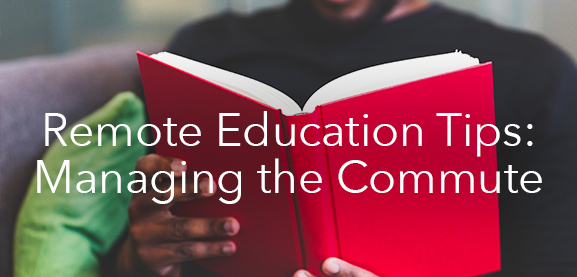Remote Education Tips: Managing the Commute

by Barth Gillan, Alpha Psi ’85
Managing the “commute” when you work (or study) from home.
Two years ago, when I started working for Zeta Psi, I started working from home. As you might imagine, working from home required me to adjust to many things. One of the things that was made easier in this transition was my daily commute – I no longer had to deal with traffic or wait at the bus stop in freezing weather. As I adjusted to the new environment, I joked that I would commute from my office down to the coffee pot in the kitchen. But the habit I developed in that ‘commuting’ experience is useful in today’s environment, where the work-from-home mandate has become typical in response to the COVID-19 pandemic – in essence, I tried really hard to compartmentalize my work space and time, and keep it separate from my personal space.
Working from home is very different from going into an office every day; going to work (or class) is very black and white in terms of differentiating between physical spaces and time commitments, while working from home is very grey, with personal and professional spaces physically occurring in one single environment throughout the day. Going to the office, or to class, is a physical change in environment that helps one to be mentally ready for the task at hand.
To help me adjust, I carved out space in a small room that I use as my office – I try to keep my work activities in that room as much as possible, and I try to keep my personal activities out of there whenever I can. As everyone starts to work from home, or to do distance learning for class, my advice to people adjusting to this new reality would be to create your own little work/study space, using it in a routine time, and holding it sacrosanct until things return to normal. It could be working from the dining room table, making your desk your designated work space, or setting up a small table someplace where you can work undistracted. Anywhere where you can concentrate and minimize disturbances. And use it for work, and if you can, keep your other activities out of that space.
This may often be easier said than done. Not all houses have that much free space, especially if the whole family is in isolation together, and not all apartments have much extra space either. So maybe this isn’t an option. But when I am in my office, my family knows I’m working.
So, if you can, try to compartmentalize to make your life easier for the next few weeks:
- Space: have a dedicated space for your work, and keep it there. I have my small little office (and yes, I do cheat because it is a small space). As well, getting up to go get a coffee is a forced break away from the screen and a chance to stretch the legs.
- Time: commit to working/studying at key times (i.e. a regular work day) and stick to it. This includes starting on time, taking regular breaks, and also allowing time out for lunch. Lately, I’ve been trying to fit in either some time to exercise or time to read (something in print), which is a nice change since all my work is seated in front of a computer screen.
- Attitude: if I need to have a focus to my work one day I tend to dress up for work. Changing my attire changes my attitude, and makes me to feel like I’m in an office and need to get the job done. This is more relatable to people who are now starting to work from home, but even students might find a different focus in your work if you change out of your hoodie and sweats.
- Tools: Yes, I cheat and check out Facebook and Instagram during the day, but I try to use my phone to do it, and to keep my laptop for work. That way, specific tools help me differentiate between the tasks (personal/work). Otherwise, it is too easy to toggle over to Facebook …. and lose half an hour.
So yes, I do “commute” to work every day simply because it helps me compartmentalize all the grey areas of working from home. I have found that this has been the best way for me to balance work demands and personal demands that need to co-exist in one place.

